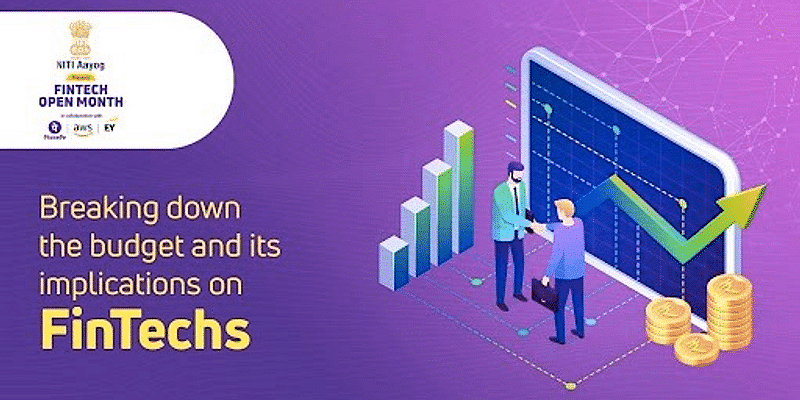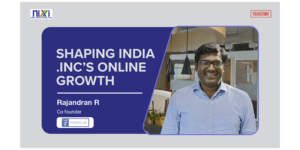The Union Budget 2022-23, presented by Finance Minister Nirmala Sitharaman, pillared itself on technology, the start-up ecosystem and integrating the concept of digitisation into every space from developing modern solutions to solving agricultural problems, modernisation of the defence sector to recognising the AVGC (Animation, visual effects, gaming and comic) sector by setting up a task force to analyse its full potential. India’s startup ecosystem, which is considered to be one of the fastest growing and third-largest in the world is quickly adapting to these changing scenarios and fostering growth at a much faster pace than one might have imagined.
Starting a conversation on the Union Budget of 2022, as part of the FinTech Month hosted by Niti Aayog and moderated by Chandra Srikanth (Editor, Technology, Start-ups and New Economy at MoneyControl), Nithin Kamath (CEO, Zerodha), Vivek Belgavi (Partner & FinTech Leader, PWC) and Harshil Mathur (Co-Founder & CEO, Razorpay) came together to deliberate on the budget highlights, announcements that excited them the most and their views on a brand-new tech-oriented India.
What stood out in Budget 2022-23 for Nithin was the fact that the Indian Government has taken a step towards accepting Cryptocurrency and is focused on getting the regulations in place for the same. Being in the capital market where most of Nithin’s users are people who lean towards digital money and crypto, this particular budget highlight came as a pleasant surprise. The second thing that excited him was that long-term capital gain surcharge won’t get capped any longer. This is a positive step towards building a digitised ecosystem, as there would be an increase in the number of people investing in tech startups.
For Harshil, there were multiple positives in the budget. From an overall FinTech perspective, the Budget definitely brought a lot to the table with its integration of digitisation and technology in multiple domains, which was very unlike any other Budget announcement that has happened. He spoke about policymakers and their role in helping drive this technological change in the coming days. He also highlighted the announcement of 75 digital banking units being set up across the country through scheduled commercial banks which will help accentuate technology in Tier-2 and 3 cities and will also boost modernization.
Furthermore, the CBDT (Central Board of Direct Tax) announced that all incomes from the transfer of any virtual asset shall be taxed at 30%. No deductions, except the acquisition cost will be accepted. Harshil said he is excited to witness the development on this front. With more details on crypto tax coming out soon, it is going to be a ride watching this development shape the Indian economy.
Vivek took the road of indirect nudges and nuances in the Budget that will go on to become the very backbone of the Indian startup ecosystem in the near future. To him, the ultimate highlight of the Union Budget was the aspect of what was not spoken. He states that large-scale formalisation or digitisation of the economy is bound to benefit the FinTech industry and consumer spending both. In terms of infrastructure, the automation of tolls and transits is one of the fastest growing segments in payments as on today’s date. The setting up of multiple payment hubs (as can be seen in the United States) for large volume payments and the mention of PLI for electronics manufacturing, are some other examples of steps taken towards building a digitised India.
Digital Rupee in a Modern India
On the Government’s commitment to digital rupee, FM Nirmala Sitharaman focused on centralised currency being the foundation of the Indian economy. Anything else is considered an “asset”.
Sharing his take on this, Nithin Kamath said that Zerodha users are primarily constituted of people who have already taken the route of digital money, so in terms of stock broking and the capital market ecosystem, the concept of “digital money” already exists.
Harshil further deconstructed the problem and went on to explain that the concept of “digital money” remains the same on a consumer level. It is at the backend that the change needs to be implemented wherein money transfers are happening seamlessly between two banks. That is when the number of instances for payment failures and such inconsistencies will be resolved.
In terms of taking a cue from other countries who have implemented their own CBDC, Vivek used the term “digital twin of a physical note”. He broke the concept down into two parts. The first part concerns the core programmability wherein he says that the adaptation of cryptocurrency – anything that operates on blockchain (decentralised system) will basically allow more control over one’s financial transactions as compared to the centralised system. Elements such as logic reconciliation and accounting will all happen on a single blockchain.
He bet on India piloting this model on subsidies because he believes that is one area with a large scope of reducing inefficiencies by the Government, making it more targeted. In the future, an education subsidy will be used for education only, ensuring the funds are not used for anything else.
Another area where he felt this technology would succeed would be offline payments. Network dependencies (in case of UPI) in rural areas will eventually go down if this model is adapted and scaled in the coming years. Mitigating such dependencies on networks will become more efficient in the future and India will take one more step towards financial inclusion and digital transformation.
Crypto Tax: What it Means
On the topic of cryptocurrency, the general euphoria surrounding the idea, and people pondering over the 30% crypto tax, Nithin said that he feels optimistic about the direction this is headed towards. He compared crypto buying and trading in today’s date with Gold purchase, which is soon becoming something that most people want to invest in. The Government is gradually recognising the legitimacy of it and hence, it will soon become a household name.
However, he further mused that with the 1% TDS, crypto exchanges in trading will become tough. Since the trading volumes are typically high in crypto, the Government will have to find other ways of generating revenue.
Policies surrounding Neobanking and Account Aggregation
On the topic of Neobanking and how private players and venture capitalists are both gradually leaning towards Neo banks, Harshil elucidated that firmer banking policies around Neobanking will ultimately legitimise the concept. With the Government supporting Neo banking startups, digital services will extend to the remotest areas in India, and will ultimately help bridge the gap between financial institutions and users. He further added that if Neobanking is implemented accurately and efficiently, it is going to fundamentally change the way we look at banking and banking licences in the MSME sector.
On the topic of neobanking and account aggregators being the big game changer of 2021, and the ecosystem considering and calling it “the UPI of lending”, Vivek said that with things going digital, the broader ecosystem is ready for this change. However, both data and compliance are critical in this case.
He was of the opinion that any non-financial data in the account aggregator pipeline will not be very valuable. One way or another, getting financial data exchange is not the challenge in today’s date. However, if account aggregation can start giving out data such as electricity bills, validated telecom data, validated data for real estate transactions, this concept is more likely to take off then, because such data points are worthwhile to consumers, and will allow for creation of better profiles with improved underwriting algorithms. All in all, once the data gamut expands for the AA framework, it is bound to become valuable.
Future of FinTech
On the topic of what the FinTech universe holds for the future, one tends to focus on the fact that there are multiple players operating in the market right now, and that number is increasing. Banks and NBFCs these days have upped their digital games, some even calling ICICI bank the most sophisticated Neo Bank of today’s time. NBFCs have started lending from their own books and have started leveraging technology to acquire and retain customers.
To this, Nithin opined that if Neobanking technologies are developed, then that step will also help him up his game when it comes to Zerodha. In today’s times, traditional banking has taken a back seat and eventually, all entities will have to up their digital games and adhere to the new rules.
Harshil says that disruption is inevitable in this case. FinTech companies focus primarily on solving their customer’s needs and as those needs evolve, companies will have to broaden their horizons, open up their APIs, and embrace disruption to unconstrainedly solve problems for their users.
Adding to that, Vivek further stated that a long-term view is required to build such features. There would be a need for mainstream elements to deliver that next level of consumer experience. Hence, an investor forward ecosystem is in the cards for a market such as India.
LIC IPO: What It Means for the Insurtech Space
Highlighting one of the biggest announcements of this year’s Budget – LIC going public, there is a lot of excitement around LIC partnering with PolicyBazaar for distribution. Pondering over the LIC IPO ramifications on the Indian insurance industry, Nithin says that India will probably see the maximum number of account openings whenever LIC announces its IPO! Harshil looks forward to this event as well saying it will definitely be a step forward for the Insurtech industry, we may see a lot of emerging players in that space.
For Vivek, the fact that LIC is partnering with PolicyBazaar is a big boost when considering the FinTech space in general. This development is sure to alter the face of Fintech, since LIC is such a veritable entity to begin with. Because the data sets for insuretchs are relatively small, it is expected to be more lucrative. Also, LIC is backed by their massive consumer ecosystems (1 million+ agents and 80 million+ customers), so when such a large majority of the population puts their stock in this move, people are sure to adapt.
In the last segment, while looking at today’s fast-paced ecosystem, wherein market players are emerging from all arenas – payments, credit, stock broking and so on, Nithin said that he is quite ecstatic about the account aggregator framework. Directionally, where he sees his company heading is advising people how to treat their finances better. He says “If we can teach people to make better financial decisions, that automatically means more money is coming into the financial ecosystem. More money will be in the hands of entrepreneurs, which in turn will help the economy”,
He talks about the need for lobbying for account aggregation as a concept. Much like Aadhaar was backed by the Indian government, UPI was backed by the NPCI, account aggregation needs that similar kind of nudge by the right hands.
Harshil says that the time is just right for the economy to go to the next level. Because more and more transactions are happening digitally, people are constantly making online purchases, which in turn hands over a lot of data points for policymakers, regulators, and businesses to work around. There are two things about the Budget that excited him the most. First is the CBDC implementation. With the right kind of implementation, programmable money is the future! The second thing is the digital banking infrastructure. With the kind of disruption expected to happen in the banking framework, the opportunities are endless on that front!
Budget Predictions
1. Nithin predicted that platforms that enable start-up investing and such are going to get a lot more traction this year.
2. Harshil said that embedded finance is likely to scale this year. Every company can scale their API in today’s date and expand their ecosystems.
3. Vivek added that this year India should aim for global markets. With great leaps in both innovation and technology, establishment of neo banks, we are a fairly underutilised market, and so the focus should be on spreading our wings to foreign markets.










![Read more about the article [Funding Alert] Y Combinator-backed matchmaking startup Betterhalf.ai raises $3M in pre-Series A round](https://blog.digitalsevaa.com/wp-content/uploads/2021/05/Betterhalf-1621918011518-300x150.jpg)